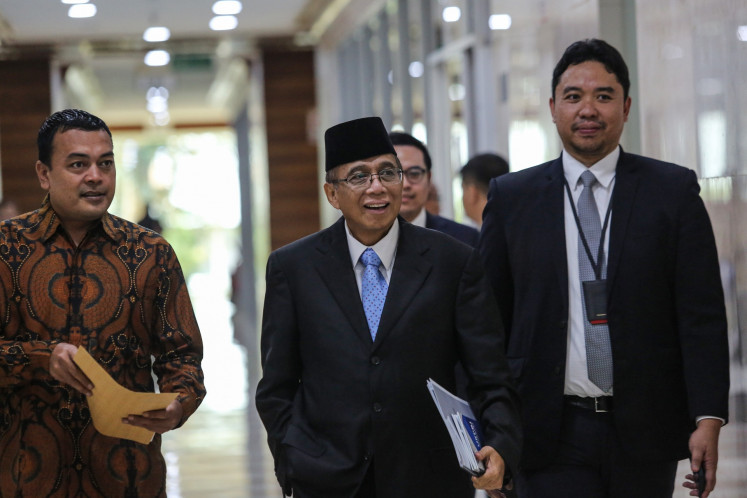Popular Reads
Top Results
Can't find what you're looking for?
View all search resultsPopular Reads
Top Results
Can't find what you're looking for?
View all search resultsIslam and dictatorship
Whether or not Islam is compatible with democracy is a misleading question
Change text size
Gift Premium Articles
to Anyone
W
hether or not Islam is compatible with democracy is a misleading question. Islam and democracy are two different entities, although both cannot be divorced when dealing with politics in the Muslim world.
In Indonesia, for instance, Islam and Muslims are two themes that cannot be ignored, from the period of the country’s independence to the era of reformation. The same rings true in Egypt, Tunisia, Libya and other Middle Eastern countries. Islam and politics are interwoven.
Islam, like any other religion, is an old system of beliefs. Democracy is a new advancement of a modern political system. Each can complement the other. Collision between the two can also occur.
Those who apologetically insist that Islam teaches democracy and those who cynically reject the compatibility of democracy and Islam treat the religion as a monolithic entity. Both sides see Islam as one religion embraced by the same Muslims in many different countries and generations. They all disregard many other aspects, such as culture and economy, which of course play the same important role as religion does in society. Equally interesting is that the two sides see Islam and Muslims, the teachings and the people, the religion and its adherents, as the same.
In fact, Islam cannot be defined easily, as this religion has been present for a long time and has been embraced by various Muslims at different times and in different areas. All interpreted Islam uniquely and differently from each other.
It is true that the Muslim world has produced many dictators, from Sukarno, Soeharto, Saddam Hussein, Zine El-Abidine ben Ali, Hosni Mubarak to Muammar Qaddafi. Authoritarian regimes with traditional Sunni and Shiite theocratic systems still prevalently rule Muslim-majority countries in the Middle East.
The question now is does Islam teach dictatorship?
Cynics argue that dictatorship is inherent in both Islamic history and texts. Early and later caliphs in numerous Islamic dynasties ruled the people without democratic principles. They simply justified their absolute political power with religious dogma, ignoring the people’s voice. However, to judge history with a modern point of view is misleading too, as democracy was not yet invented at that time.
Those who contend that Islam prohibits despotism will extract some messages from both the Koran and prophetic tradition, which can be interpreted in a certain way, so much so that the modern concept of democracy is found in the texts. Indonesian Muslim leaders, from Mohammad Natsir, Agus Salim, Sukarno to Nurcholish Madjid, took this path.
Once again, religion is not the sole factor that can be blamed for what happens in society.
In fact, many pundits suggested that the current people’s movement in the Middle East that dethroned Ben Ali in Tunisia and Mubarak in Egypt mainly consists of a post-Islamic generation. The extent to which Islamist organizations, such as the Muslim Brotherhood, played a role in the protests seems minor.
The sufferings shared by the common people, disregarding their ideology and schools of thought, under tyrannical rulers became the main impulse of the peaceful democratic demonstrations.
As in Indonesia in 1997, in the current Middle Eastern euphoria the people’s eagerness to topple despotic regimes was not stimulated merely by Islamic religious sentiment. Nor did religious radicalism or Western intervention inspire the people to do so, as Qaddafi accused his own people.
However, in the aftermath of the old regimes’ fall, Islamists are ready to throw their hat in the political arena. This faction, like any other faction with different ideologies, wants to participate in the ballots.
As in the case of Indonesia, after Soeharto’s downfall, Islamism, after having been suppressed by militaristic means during the New Order, seized the opportunity to revive. However, political distrust hampered political parties with Islamist agendas, which never gained a significant number of votes.
Indonesians preferred secular parties, which, unfortunately, are not bold enough to declare themselves as secular.
If Islam does not teach either democracy or dictatorship clearly, Islamism is ready to impose ideological tenets upon Muslims. The post-Islamic generation should be prepared to face them.
The writer is a lecturer at the Sunan Kalijaga State Islamic University, Yogyakarta.










